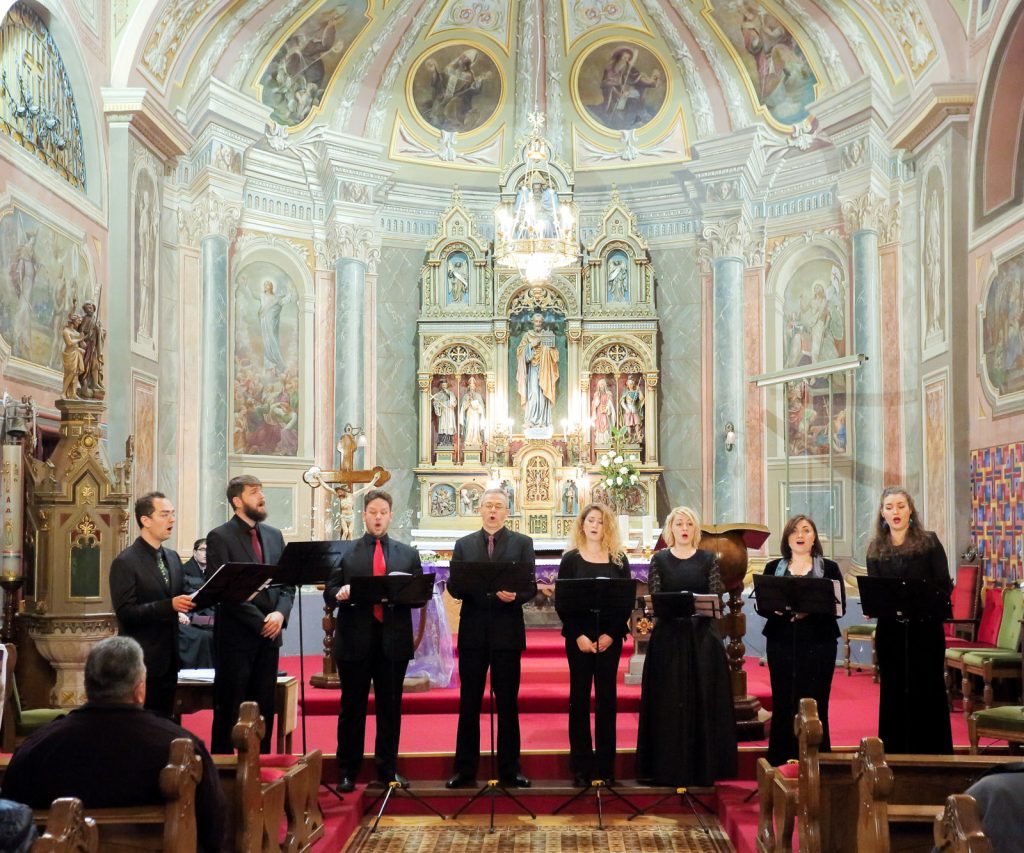Monday, September 24, 8 p.m.
Franciscan Church
Project Lazarus
Daniela Perosa, Tanja Rupnik, Tanja Ruždjak, sopranos
Nikolina Virgej Pintar, Loredana Medan, Sonja Runje, mezzosopranos
Siniša Galović, Ivan Martinčić, Hrvoje Foretić, tenors
Marin Čargo, baritone
Robert Palić, Siniša Štork, bassos
Soloists of Orchestra Libera Classica
Natsumi Wakamatsu, Kaori Toda, violins
Hiroshi Narita, viola
Hidemi Suzuki, cello
Hiroshi Kaneko, lute
Naoki Ueo, harpsichord
Darijan Ivezić, conductor
Programme:
CROATIAN MUSICAL HERITAGE
Francesco Sponga Usper
Messa concertata del secondo tuono a 5
Kyrie
Gloria
Credo
Sanctus
Agnus Dei
Francesco Sponga Usper
Ave Maria, for six voices and basso continuo
Francesco Sponga Usper
Expectans expectavi, motet for three voices, two violins and basso continuo
Francesco Sponga Usper
Salmi vespertini, for four to ten voices and basso continuo
Dixit Dominus
Beatus vir
Laudate Dominum
In convertendo
Beati omnes
De profundis
Nisi Dominus
About the performer:
 Ensemble Projekt Lazarus operates since 2013 within the association of Croatian Music Center and its initiator and founder is the ensemble bass Robert Palić. The research, revitalization, promotion, and presentation of Croatian musical heritage are primer objectives of ensemble Projekt Lazarus, which are being realized through two main processes: exploring yet undiscovered and unprocessed musical literature from 16th to 18th century in cooperation with the experts for that period, and modeling professional ensemble necessary for the preparation and presentation of musical pieces. In addition, Projekt Lazarus focuses on the performance of the works that are rarely performed as well as those that have not yet been recorded. In the attempt to save from oblivion valuable monuments of Croatian musical heritage, the musicians of Projekt Lazarus have performed, in their first years, the works of outstanding Croatian early music composers – Ivan Lukačić, Vinko Jelić, and Ivan Šibenčanin. Particular attention should be paid to the performance of the only preserved work of Damjan Nembri – Brevis et facilis psalmorum from 1641, which the ensemble held within few concerts. The ensemble marked in 2015 the 120th anniversary of the birth of Dr. Dragan Plamenac, the founder of modern Croatian musicology whose last discovery and the subject of study was this Nembri’s work. The concert entitled Brevis et facilis psalmorum was presented in November 2016 and at the 12th Croatian Music Festival in Vienna. Up to now, the ensemble has held numerous concerts with the aim of presenting top achievements of Croatian composers performed in the series Lux Musicae, organized by Croatian Music Center, as well as the cycle of classical music Po svetonedeljskim crkvama i kapelicama organized by the department of Matica hrvatska in Sveta Nedelja.
Ensemble Projekt Lazarus operates since 2013 within the association of Croatian Music Center and its initiator and founder is the ensemble bass Robert Palić. The research, revitalization, promotion, and presentation of Croatian musical heritage are primer objectives of ensemble Projekt Lazarus, which are being realized through two main processes: exploring yet undiscovered and unprocessed musical literature from 16th to 18th century in cooperation with the experts for that period, and modeling professional ensemble necessary for the preparation and presentation of musical pieces. In addition, Projekt Lazarus focuses on the performance of the works that are rarely performed as well as those that have not yet been recorded. In the attempt to save from oblivion valuable monuments of Croatian musical heritage, the musicians of Projekt Lazarus have performed, in their first years, the works of outstanding Croatian early music composers – Ivan Lukačić, Vinko Jelić, and Ivan Šibenčanin. Particular attention should be paid to the performance of the only preserved work of Damjan Nembri – Brevis et facilis psalmorum from 1641, which the ensemble held within few concerts. The ensemble marked in 2015 the 120th anniversary of the birth of Dr. Dragan Plamenac, the founder of modern Croatian musicology whose last discovery and the subject of study was this Nembri’s work. The concert entitled Brevis et facilis psalmorum was presented in November 2016 and at the 12th Croatian Music Festival in Vienna. Up to now, the ensemble has held numerous concerts with the aim of presenting top achievements of Croatian composers performed in the series Lux Musicae, organized by Croatian Music Center, as well as the cycle of classical music Po svetonedeljskim crkvama i kapelicama organized by the department of Matica hrvatska in Sveta Nedelja.
In December 2016, Projekt Lazarus made a programmatic breakthrough marking the 110th birth anniversary of Boris Papandopulo. Through the project Following the steps of Damjan Nembri ensemble Projekt Lazarus has held a concert in August 2017 at the Basilica San Giorgio Maggiore in Venice (Italy), as a part of VII International Festival Gaetano Callido, 56th Hvar Summer Festival and 47th Varaždin Baroque Evenings. In 2018, the ensemble marked the 370th death anniversary of Croatian composer Ivan Lukačić with concerts in his birthplace, Šibenik – the programme was consisting of motets from his collection Sacrae cantiones.
Japanese Orchestra Libera Classica is specialized in music from the 18th century, performed on authentic instruments or their replicas. Prominent Japanese cellist and conductor, Hidemi Suzuki, founded it in 2001; in May 2002, they started working. Now it has more than 30 members, who work not only in Japan but also in many European ensembles like Orchestra of the Eighteenth Century or Les Arts Florissants and others. The orchestra regularly performs in Tokio in Hamarikyu Asahi Hall – TDK Arte dell’arco usually records and publishes those concerts. Orchestra Libera Classic’s specialties are the works of Wolfgang Amadeus Mozart and Joseph Haydn, and their performances, according to numerous critics, are characterized by great expressiveness and a new interpretative approach.


